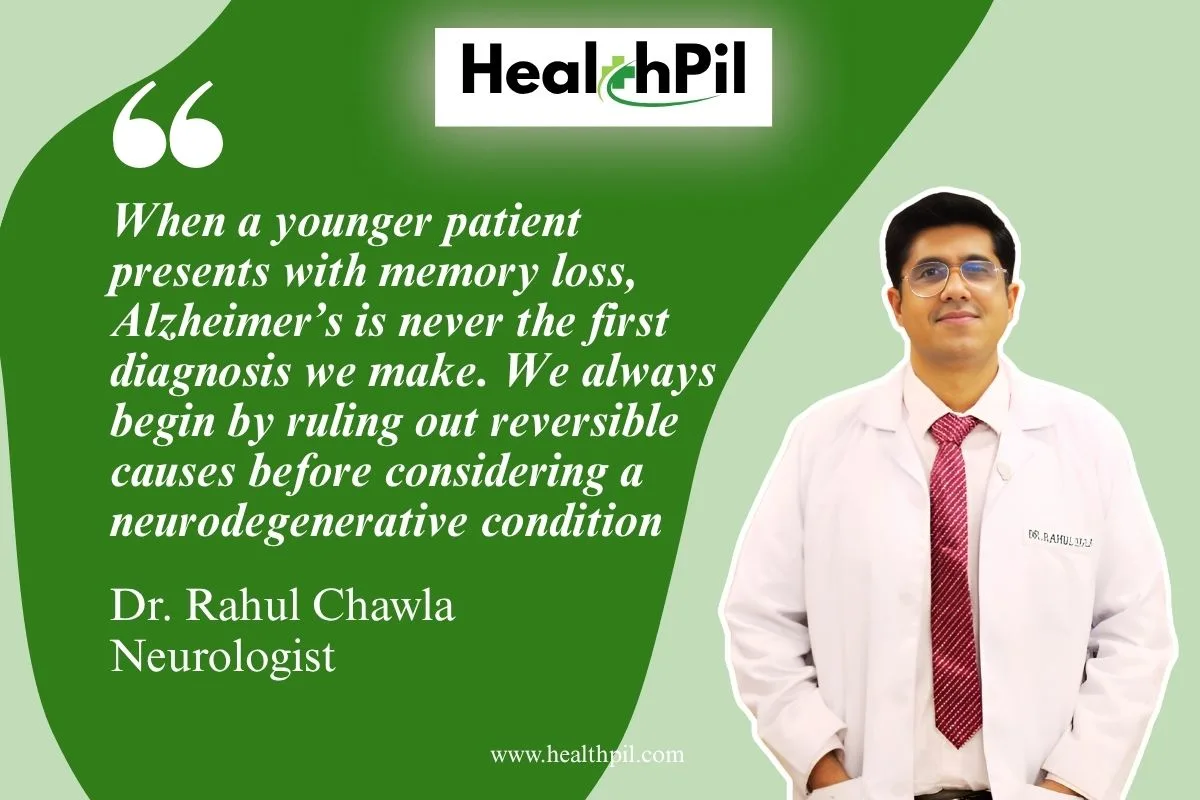In the recently released film Saiyaara, the story takes an emotional turn when the lead actress begins showing signs of memory loss. At first, it’s subtle; like forgetting names, repeating conversations. But as the narrative unfolds, we realise what’s happening. She’s been diagnosed with early-onset Alzheimer’s disease.
It’s the kind of twist you don’t expect. We’re used to seeing Alzheimer’s as a disease of the elderly. Elderly people struggling to remember their children’s names, unable to follow conversations. But seeing it in someone in their 20s or 30s feels different.
The film, while taking a few cinematic liberties, touches a raw nerve. People can develop Alzheimer’s in their early years such as 20s and 30s. So, when they do, it’s often misdiagnosed, or misunderstood
But, let’s talk about what it actually is.
What is Early-Onset Alzheimer’s Disease?
Alzheimer’s disease is a progressive neurodegenerative condition that affects memory, thinking, and behaviour. It is the most common cause of dementia globally. But when its symptoms appear before the age of 65, it’s called early-onset or young-onset Alzheimer’s.
This form is much less common than typical Alzheimer’s, but it’s far from rare. According to data from the Alzheimer’s Association, about 5 to 6 percent of all Alzheimer’s cases are early-onset. In India, population-based statistics are less clear, but smaller clinic-based studies and neurologist reports estimate that early-onset dementia accounts for 4–10 percent of dementia referrals in major hospitals.
How Does Alzheimer’s Begin?
It doesn’t start with someone suddenly forgetting who they are. The decline is quite gradual. Often too gradual to notice right away.
It might begin with:
● Forgetting recent conversations or misplacing things frequently
● Struggling to find the right words or following complex discussions
● Subtle changes in personality irritability, mood swings, or withdrawal
● Trouble managing tasks that were once routine
● Getting lost while driving through familiar areas
Sometimes these are brushed off as stress or burnout. Especially in younger adults juggling demanding jobs, raising kids, and dealing with everyday chaos. But if these signs continue, they need to be evaluated.
In Saiyaara, the lead character’s descent into confusion is portrayed with an emotional intensity. But it’s the early signs that often get missed in real life. By the time patients reach a neurologist, they’ve usually seen a psychologist, a psychiatrist, and often tried alternative treatments too.
What Causes Alzheimer’s to Begin So Early?
In older adults, Alzheimer’s usually develops due to a complex mix of age-related changes, genetic predisposition, and other health factors. But in early-onset cases, genetics plays a more direct role.
There are three genes that have been closely linked with inherited forms of early-onset Alzheimer’s:
1. PSEN1 (Presenilin 1)
2. PSEN2 (Presenilin 2)
3. APP (Amyloid Precursor Protein)
Mutations in these genes can lead to increased production of abnormal amyloid proteins in the brain, which accumulate and damage brain cells. These cases are autosomal dominant, meaning that if one parent carries the faulty gene, there’s a 50% chance of passing it on to their child.
But most early-onset Alzheimer’s patients don’t have these gene mutations. Around 90% of early-onset cases are what we call “sporadic”, meaning they occur without a known inherited cause.
Other possible contributors include:
● Past head trauma or concussions
● Vascular risk factors (diabetes, hypertension, high cholesterol)
● Chronic inflammation
● Rare autoimmune or infectious causes
How Is Early-onset Alzheimer’s Diagnosed?
This is one of the most challenging parts. Early-onset Alzheimer’s is often misdiagnosed as depression, anxiety, bipolar disorder, or even attention-deficit issues.

“When a younger patient presents with memory loss, Alzheimer’s is never the first diagnosis we make. We always begin by ruling out reversible causes before considering a neurodegenerative condition,”
says Dr. Rahul Chawla, Neurologist and Founder of HealthPil.
This is a critical step. Other conditions like thyroid dysfunction, vitamin B12 deficiency, depression, or side effects of medications can cause similar symptoms and are often reversible.
Once reversible causes are ruled out, the next steps in diagnosis usually include:
● Detailed history-taking: This includes not just memory complaints, but behavioural and personality changes, family history, and functional decline.
● Neuropsychological testing: Structured cognitive assessments help detect impairments in memory, language, visuospatial skills, and executive functioning.
● MRI brain: This can show patterns of brain shrinkage, especially in the hippocampus and temporal lobes.
● Blood tests: To rule out infections, metabolic or autoimmune causes, and vitamin deficiencies.
● CSF biomarker testing: Available in select centres, this can detect beta-amyloid and tau protein levels associated with Alzheimer’s.
● Genetic testing: Recommended in patients with a strong family history or early symptoms.
● PET scans: These can detect metabolic changes or beta-amyloid plaques, but are expensive and not widely available in India.
What Makes Early-Onset Alzheimer’s So Devastating?
Most patients with early-onset Alzheimer’s are in the middle of their most productive years. They are raising children, managing careers and taking care of aging parents.
A diagnosis at this stage is a social and emotional crisis.
● The person may lose their job due to poor performance or confusion
● Relationships suffer as they struggle with mood, judgement, and communication
● Caregiving often falls on a spouse or adult child who wasn’t prepared
● The stigma around dementia makes it harder to seek help early
● Financial strain adds another layer of distress
Can Early-Onset Alzheimer’s Be Treated?
There is no cure yet. But the goal of treatment is to slow the progression, manage symptoms, and support the patient and family through the disease.
Medications like:
● Donepezil, Rivastigmine, and Galantamine – help improve neurotransmitter levels
● Memantine – used in moderate to severe cases
● Antidepressants or anti-anxiety medications – for mood symptoms
● Sleep aids – if sleep is disrupted
Non-drug support is just as important:
● Cognitive rehabilitation therapy – structured activities to improve focus and memory
● Occupational therapy – to help manage daily living
● Counselling for caregivers – to prevent burnout
● Support groups – to share and learn from others in similar situations
How Fast Does Alzheimer’s Progress?
Every person is different. But in general, early-onset Alzheimer’s progresses faster than typical late-onset cases. The average survival after diagnosis is 8–10 years, but it can vary widely.
Because younger brains are more active and engaged, the contrast between “before” and “after” becomes sharper. The decline can feel more dramatic and the emotional toll on both the patient and their loved ones is immense.
How HealthPil Can Help
If you or your loved one is showing signs of forgetfulness, confusion, or any unexplained behavioural changes especially at a younger age, it’s important not to ignore it. Early evaluation can make all the difference.
On HealthPil, you can:
● Speak directly with experienced neurologists and psychiatrists
● Ask your doubts for free if you’re unsure where to begin
● Book a second opinion if a diagnosis has already been made and you want to understand what comes next
Disclaimer
This article is meant for public awareness and educational purposes only. It does not substitute medical advice, diagnosis, or treatment. If you suspect symptoms of dementia or cognitive decline, please consult a qualified doctor immediately.
You can reach out to verified neurologists and mental health experts via HealthPil, or speak to a professional at your nearest healthcare facility.

